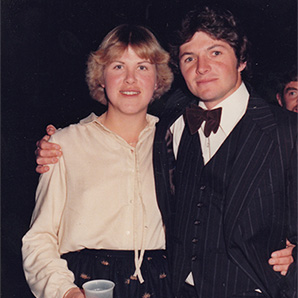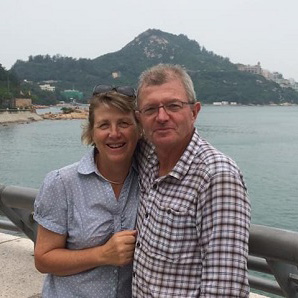Prue and Mark Kesby

 Prue and Mark Kesby
Prue and Mark Kesby
The annual Rural Science Ball, weekend barbecues and helping to organise two rodeos ... Gunnedah couple Prue and Mark Kesby have many fond memories of UNE.
The pair met on their very first day, in 1978, and cultivated a friendship over several years during their studies. As a Bachelor of Rural Science student, Prue shared many classes with Mark, a Bachelor of Science in Agriculture student, and their paths frequently crossed socially.
"My brother attended Armidale Teacher's College and then UNE, and Prue's older sister had studied Natural Resources at UNE, so they knew each other," Mark says. "My brother was also a tutor at Robb, along with Prue's brother-in-law."
As a resident of Wright College, Mark soon found himself playing rugby for United - the combined Wright, Austin and Earl Page team - while Robb College resident Prue played soccer and participated in the UNE orienteering team. But weekly "barbecues and kegs" brought them and most of their rural science cohort together.
"There was a large face-to-face commitment with Rural Science in those days; about 30 hours a week," Prue says. "You spent more time socialising with fellow students than other people."
As a member of the Rural Science "keg committee", Mark was roped into helping run a Rural Science Rodeo at Kirby in the late 1970s, along with Prue. "It was a lot of fun," she says. "We had steer riding and so on, but also lots of novelty events like the greasy pole, apple bobbing, piggyback riding and sack races."
Mark also recalls the annual Rural Science Ball as one of the highlights of the social calendar. "I remember going to one at Newholme or somewhere in a shearing shed in the middle of winter," he says. "I think it was the coldest night I have ever put in in my life. Even the beer slops on the bar froze."
Still, the couple warmed to each other. They married in February 1983, a year after completing their UNE degrees, and Prue joined Mark at his family farm at Gunnedah after adding a Diploma in Teaching to her qualifications.
"Prue soon went teaching, and luckily she did," Mark says. "It was the middle of drought and without Prue's teaching income we would have gone broke."
"Rural Science has been a very, very good degree as the basis for teaching," says Prue, who originally hailed from Hobart. "The strong emphasis on maths and science, coupled with the agriculture, gave me a good general knowledge and enabled me to teach a wide range of subjects. I knew I didn't want to be a farmer, but then I went and married one!"
Mark subsequently completed a Graduate Diploma in Agricultural Economics at UNE and has combined farming with a 20-year commitment to Landcare, plus additional work as an environmental agronomist, "trying to help farmers become more sustainable". After raising two sons and running a Limousin cattle stud for a time, Mark and Prue are now transitioning to retirement, and (before international borders were closed due to COVID-19) enjoy overseas travel.
They were due to return to Nepal in September, a country that captivated them during an Australian Himalayan Foundation fundraising trip three years ago. "It was 12 months after the earthquake and we spent 18 days visiting schools in remote communities and doing some sight-seeing to support the local economies," Prue says.
"We love the place and the people," adds Mark. "Agriculturally, it was very interesting. We saw cornfields one row wide on the sides of mountains, wheat being produced using oxen-drawn wooden ploughs and hand-threshing. It's amazing. And then everything that is produced gets put on their backs and taken on foot to market. It's tough work in very poor communities."
The experience inspired Prue and Mark to become involved in the group Seven Women, which aims to empower marginalised Nepali women through building sustainable social enterprises and tourism. "Everyone in Nepal is struggling to get ahead, and women, especially, have a difficult time in this patriarchal society," says Mark. "Any opportunity they get, they appreciate it and take it. In Nepal, any help you give makes a difference."
Prue has also been impressed by what she has seen in schools. "There is a lot being done to empower girls and to teach them about sexual health, domestic violence and looking after the environment, in the hope they will take it back to their families," she says.
Looking back, the couple say their own UNE education equipped them with valuable life skills.
"A degree can't teach you everything, but what it can teach you is how to seek knowledge and sort the rubbish from the truth, which is becoming more and more important today in the era of fake news," Mark says.
For Prue, the learning and engagement with UNE has continued throughout her career. "For many years I have accompanied high school students visiting UNE as part of the GRASS (Growing Regional and Agricultural Students in Science) program," she says. "It's been great to continue my association and to encourage the next generation of students to study Science and Agriculture at UNE."

